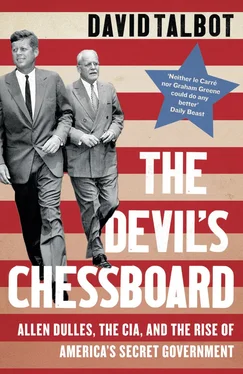The most egotistical defendants, like Goering and Schacht, struck defiant poses. At times, Reichsmarschall Goering mugged for the courtroom, laughing at the prosecutors’ mispronunciation of German names and puffing his cheeks indignantly when they made errors about the Nazi chain of command.
The Reichsmarschall had not even bothered to run from the advancing American troops in the war’s final days, convinced that he would be treated as the eminent representative of a defeated but noble people. His first hours in captivity surely encouraged his optimism, as the U.S. 36th Infantry Division soldiers who came for him at his quarters in southern Bavaria chatted amiably with him and treated the well-fed Nazi to one of their chicken and rice dinners from a tin can. Goering had no idea that he would be tried as a war criminal. At one point he blithely asked an American commander, “Should [I] wear a pistol or my ceremonial dagger when I appear before General Eisenhower?”
But the Reich’s crimes would not be easily dismissed at Nuremberg. The very name of the city conjured not only Nazi triumphalism, but the race laws that Hitler ordered to be written in 1935—laws that, by criminalizing Jewishness, led inexorably to the butchery that followed. The city and its Palace of Justice had long been drenched with blood.
Nine days into the trial, the dead would make a dramatic appearance in the courtroom, conjured in a twenty-two-minute documentary called Death Mills . The documentary was made by Hollywood director Billy Wilder, an Austrian-born Jew who had fled Hitler, who compiled it from scraps of film taken by U.S. Army Signal Corps cameramen during the liberation of several Nazi concentration camps. In his opening statement, Robert Jackson, the chief U.S. prosecutor at Nuremberg, warned the courtroom that the film “will be disgusting and you will say I have robbed you of your sleep.”
But nothing could prepare those who viewed the film for what they would see that day: the piles of shriveled corpses and the walking skeletons that greeted the stunned and sickened American liberators, the mangled remains of someone who had been experimented on by Nazi doctors (“ This was a woman,” intoned the narrator), the mounds of human ash to be sold as farm fertilizer, the pyramids of human hair and boxes of gold dental fillings to be sold for wigs and jewelry—the final value extracted from the victims of the Reich. One of the most punishing images was not grisly, but it would stay fixed in the mind’s eye—a close-up shot that lingered on a bin of children’s shoes, well worn from play.
As the film unreeled in the darkened courtroom, low lights were aimed at the defendants so the courtroom could see their reaction. From this point on, there was no place to hide. “ The hilarity in the dock suddenly stopped,” noted one courtroom witness. While the terrible images flickered on the screen, one criminal mopped his brow; another swallowed hard, trying to choke back tears. Now one buried his face in his hands, while another began openly weeping. (“ These were crocodile tears. They wept for themselves, not for the dead,” observed a British prosecutor.) Only the most arrogant remained impervious, with Schacht, Hitler’s banker, turning his back to the screen, and Goering “trying to brazen it out,” in the words of assistant U.S. prosecutor Telford Taylor.
Afterward, Goering complained that the film had ruined the show he was putting on for the courtroom: “ It was such a good afternoontoo, until they showed that film. They were reading my telephone conversations on the Austrian [annexation] and everybody was laughing with me. And then they showed that awful film, and it just spoiled everything.”
The Nuremberg trial was a moral milestone, the first time that top government officials were held accountable for crimes against humanity that in earlier days would have likely been dismissed as the natural acts of war. During the war, Allied leaders had issued a “full warning” that Nazi war criminals would be pursued “to the uttermost ends of the earth … in order that justice be done.” But it took a heated debate within Allied diplomatic circles before the international tribunal was finally established in Nuremberg. And even after it was up and running, the process was fraught with political maneuvering.
President Roosevelt and Prime Minister Winston Churchill were so intent on meting out a fitting punishment that they originally favored taking the law into their own hands and summarily shooting Hitler’s top military, ministerial, and party ranks— Churchill estimated the numberwould be somewhere between fifty and a hundred men. The prime minister thought that once the proper identifications were made, the killing could be completed within six hours. In one of history’s deeper ironies, it was Joseph Stalin who insisted that the Nazi leaders be put on trial, lecturing his Western allies on the merits of due process. “U[ncle]. J[oe]. took an unexpectedly ultra-respectable line,” Churchill wrote Roosevelt after meeting with Stalin in Moscow in October 1944. The Soviet premier told Churchill that “there must be no executions without trial; otherwise the world would say we were afraid to try them.”
Roosevelt finally came around to the idea of an international war crimes tribunal. But once again he had to face stiff opposition from within his own State Department. Future foreign service legend George Kennan, who was a junior diplomat in the U.S. embassy in Berlin when war broke out, was one of thosewho took a strong stand against punishing Nazi war criminals. Purging these leaders from German society would not only be greatly unpopular with the German people, Kennan argued, it would be hugely disruptive. “We would not find any other class of people competent to assume the burdens [of leading postwar Germany],” he insisted. “Whether we like it or not, nine-tenths of what is strong, able and respected in Germany” carried the taint of Nazism.
It was not until late 1943 that a small, underfunded international commission began the urgent work of trying to define the barbaric new crimes emerging from World War II and compiling a list of war criminals for prosecution as soon as peace permitted. FDR appointed an old friend named Herbert Pell as the U.S. representative to the United Nations War Crimes Commission. (The United Nations was yet to be founded, but this is how the Allies sometimes referred to themselves during the war.) Pell, a fellow New York Brahmin and ardent New Deal supporter, quickly found himself in a political vortex, besieged by State Department bureaucrats who did not consider an international tribunal necessary and were determined to sabotage Pell’s efforts.
At six feet five inches and 250 pounds, Pell was a towering man—and, raised in the rarefied societies of Tuxedo Park and Newport Beach, he had more than enough self-confidence to hold his own among his Washington foes. The Pells had inherited a tobacco fortune, their forefathers had been granted the land that would become the Bronx and Westchester County by the British crown, and there was no need for “Bertie” Pell to do a thing with his life if he had so chosen. Indeed, with his waxed mustache and pince-nez glasses, he seemed like a throwback to the Gilded Age. But inspired by the rambunctious reformism of Teddy Roosevelt, Pell leaped into the grubby fray of American politics, albeit in Manhattan’s silk stocking district on the Upper East Side, which, despite its long aversion to Democrats, briefly elected him to Congress. By the time his old Harvard classmate Franklin Roosevelt ran for president in 1932, Bertie Pell was a full-on renegade from his class, which he dismissed as a sybaritic and selfish lot whose “ piglike rush for immediateprofits” had brought ruin to the country in the crash of 1929.
Читать дальше











